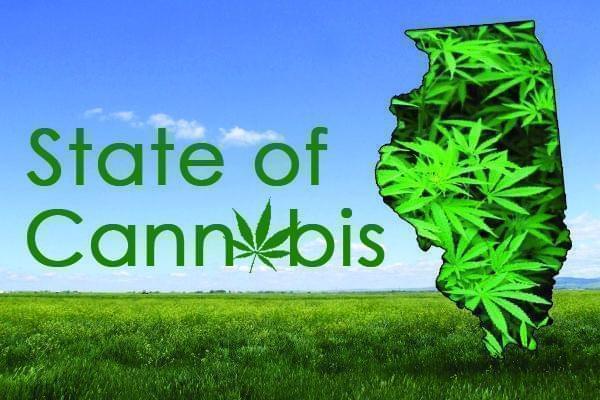An Equitable Legal Pot Market; Workplace Wellness; Meteotsunamis & Great Lakes

NPR Illinois
As Illinois inches closer to legalizing recreational marijuana, we take a look at what a more racially diverse legal cannabis marketplace would look like. Also, we'll talk about a new a new study which says that workplace wellness programs actually do little to improve overall health or lower spending. And, you might think tsunamis only affect islands halfway across the world. But, scientists say 'meteotsunamis' hit the Great Lakes more than one hundred times a year.
All this week, Illinois public radio stations have been taking a look at our state’s attempt to legalize marijuana. Medical marijuana is already legal in Illinois, but a bill for recreational use could come from lawmakers any day now according to our colleagues at NPR Illinois. That will come from Representative Kelly Cassidy and state Senator Heather Steans. Farmers are also gearing up to grow industrial hemp. And whether or not recreational use is legalized, the business of cannabis is already a big one. Maybe you’ve heard some of these stories on your local NPR station. You can check out the entire State of Cannabis series right here if you are interested.
Back in 2015, Illinois issued the first licenses for medical marijuana dispensaries. But, four years later there are still no black-owned dispensaries in Illinois. Now, as Illinois inches closer to legalizing recreational marijuana, industry advocates are calling for more minority representation in the marijuana industry.
Kiana Hughes is the Educational Director for the Chicago chapter of NORML, that’s the National Organization for the Reform of Marijuana Laws. She spoke with us from Chicago. Susie An has been reporting on this for WBEZ and she also joined us on the line.
As Illinois moves closer to legalizing recreational marijuana, industry advocates are urging lawmakers to include racial equity components that open the door for a more diverse marketplace. https://t.co/DedqYEUJ6Z
— WBEZ (@WBEZ) April 26, 2019
And-
How many of you have participated in a wellness program through your work? Maybe your job got you a gym discount? Or is encouraging you to quit smoking? Or offers yoga classes during lunch breaks. The idea is to have healthier workers and save money on healthcare costs.
But, a new study recently published in the Journal of American Medicine Association says that workplace wellness programs actually do little to improve overall health or lower spending. One of the lead authors is Katherine Baicker, the Dean of the Harris School of Public Policy at the University of Chicago. Also on the line was Julie Appleby, a senior correspondent with Kaiser Health News.
Workplace wellness has now become an $8 billion industry, with 80% of large U.S. employers offering these type of programs.
— The 21st (@21stShow) May 2, 2019
And about 1/2 require you to have some kind of test, explains @Julie_appleby
Plus-
On June 26th, 1954, people were out enjoying a calm summer morning in Chicago. They were fishing and picnicking at Lake Michigan’s Montrose Harbor when an 8 to 10-foot wave suddenly submerged the lakefront, killing eight people. Scientists now know that it was a meteorological tsunami, or a meteotsunami.
Researchers estimate that there are more than a hundred meteotsunamis every year across the Great Lakes, the majority of those happening in the Chicago area. Although some are larger than others And, the bulk of these waves are happening now- in late April and early May.
Eric Anderson spoke with us on the line from Michigan. He’s a physical oceanographer for NOAA’s Great Lakes Environmental Research Laboratory.
87 year-old Marvin Katz was there during the 1954 meteotsunami. He described it as an "elevator of water" rather than a movie-esq giant wave.
— The 21st (@21stShow) May 2, 2019
"In general they're long waves... Much longer than we might be able to perceive with our eyes," says Anderson. https://t.co/ScMu4PZis0

